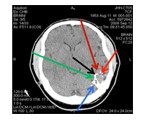 Every 21 seconds, someone suffers a serious brain injury, such as a stroke, which is the third-leading cause of death in the United States and the leading cause of long-term disability.
Every 21 seconds, someone suffers a serious brain injury, such as a stroke, which is the third-leading cause of death in the United States and the leading cause of long-term disability.
Dr. Paul Lovoi knows firsthand how devastating a stroke can be. He named his company after his deceased wife, Jan, who died from a stroke at the age of 55. Until now, there have been limited ways to quickly and reliably diagnose these calamities. Today, Jan Medical is on the cusp of commercializing its first application of a revolutionary system, Nautilus NeurowaveTM, designed to help doctors quickly identify vasospasm and strokes.
“Most neurological conditions that have a physiological basis and are several millimeters in extent or larger will leave a unique and detectable signature with our system,” says Dr. Lovoi. “We believe that Nautilus NeuroWave can have an enormously favorable impact by empowering healthcare providers to make a reliable assessment of stroke in just minutes. Patient outcomes will then be improved because healthcare providers will have actionable information on a timely basis and be able to confidently begin treating patients sooner.”
Dr. Lovoi has more than 30 years of experience managing and starting innovative companies. Prior to founding Jan Medical, he was co-founder, prime inventor and CEO of Xoft Inc., a company focused on using tiny x-ray tubes to treat cancer. Xoft’s AXXENT® cancer treatment product is FDA-cleared for breast, endometrial, rectal and skin cancer treatment. In addition to Jan Medical and Xoft, Dr. Lovoi founded Candescent Technologies, a flat panel display company; and INTA, a high temperature materials company. Dr. Lovoi has 50 patents issued and 20 pending applications. He has a Ph.D. in physics from the University of New Mexico (his research was conducted at Los Alamos National Laboratory) and has completed the Stanford Executive MBA program.
While Jan Medical’s Nautilus NeuroWave system is designed to address all areas of stroke, and ultimately traumatic brain injury, the company’s initial focus is detection and monitoring of vasospasm after subarachnoid hemorrhagic stroke and determination of ischemic stroke in the critical first few hours post-event.
Vasospasms are a serious complication for survivors of hemorrhagic stroke. Severe vasospasms can cause a second stroke when a brain vessel becomes constricted such that blood flow is severely restricted or even prevented from flowing beyond the constriction. Existing protocols for patients who survive an initial subarachnoid hemorrhagic stroke caused by bleeding into the space surrounding the brain call for monitoring for vasospasm for up to 21 days in a Neuro Critical Care Unit (NCCU).
Annually, in the US, 1.5 million patients present for medical evaluation with stroke-like symptoms; approximately 750,000 of these actually have had a stroke—of which 87% (650,000) are ischemic and 100,000 are hemorrhagic. In a “stroke alert,” computed tomography (CT) reliably determines whether a stroke is caused by hemorrhage, such as occurs with a ruptured aneurysm. Unfortunately, during the critical therapeutic window, CT is not equally able to detect an ischemic stroke.
“Most strokes are a treatable neurological emergency,” says Dr. Lovoi. “But every second counts; time is brain. Yet nothing is currently effective at detecting ischemic stroke during the brief window in which therapy can be effectively and safely administered. I can tell you from personal experience that today’s standard of brain imaging is expensive, slow, or not readily available.
“And for those patients who do eventually get their brain imaged, 50 percent of them have not had a stroke. The cost of these wasted resources is staggering,” Dr. Lovoi says.
“We have developed an entirely new way to assess the brain. In just a few minutes, Jan Medical’s portable system, Nautilus NeuroWave, is designed to identify whether or not a patient has had a stroke, whether that stroke is hemorrhagic or ischemic, and where it is located,” says Dr. Lovoi.
“Our system is capable of continuous monitoring of a dire clinical need in just minutes and without the use of radiation,” says Dr. Lovoi. “In addition, Nautilus NeuroWave is operator-independent, reimbursement will be supported by DRG, and pivotal trials are  underway. Furthermore, Nautilus NeuroWave is a platform technology a $1.6B stroke market opportunity.
underway. Furthermore, Nautilus NeuroWave is a platform technology a $1.6B stroke market opportunity.
“Hundreds of thousands of stroke patients who present to emergency departments routinely undergo a CT scan,” says Dr. Lovoi. “Generally, this rules out hemorrhagic stroke because the CT scan detects pooled blood better than 95% of the time. Unfortunately, when there is no pooled blood, a CT scan can only detect an ischemic stroke 15% of the time within the generally accepted therapeutic window, and the CT scan takes 45 minutes or more from ordering the test to having the results.
“On the other hand,” Dr. Lovoi adds, “our system is designed to detect ischemic stroke, or lack of blood supply, with high sensitivity and specificity. Therefore, Nautilus NeuroWave could complement the CT scans by becoming a critical stroke-triage tool.”
Jan Medical’s Nautilus NeuroWave is the first portable brain-sensing system designed to rapidly diagnose ischemic strokes in just minutes. The Jan Medical device emits no energy into the brain and is therefore positioned as “Non-Significant Risk” in clinical trial protocols. Continuous-monitoring options with the device include hours, days or weeks until the condition is resolved or requires intervention; all other brain imaging alternatives, such as CT and MRI, are “snapshots.”
Jan Medical has successfully completed a 40-patient stroke pilot study at Johns Hopkins Hospital led by Principal Investigator Dr. Eric Aldrich. Patients with a wide variety of brain conditions were measured and compared to normal subjects. In all cases, the Jan Medical system was able to differentiate ‘normal’ from other conditions, as well as separate patients with specific stroke conditions or vascular abnormalities into unique categories. The system correctly identified the location of the problem area within the injured brains.
An investigator-led trial on concussion by Dr. Paul Auerbach, Stanford, has demonstrated that the Nautilus NeuroWave can detect and track the recovery from sports-related concussion. The paper describing this trial is in preparation. Further studies using functional MRI as the gold standard are planned.
Jan Medical has closed $3.1 million of an $8 million “A” round. Brainlab GmbH and venture are committed to this round, and Jan Medical is looking to add additional investors to complete the round, which will carry the company through regulatory clearance, market launch and to positive cash flow.